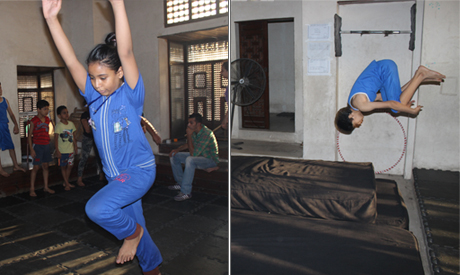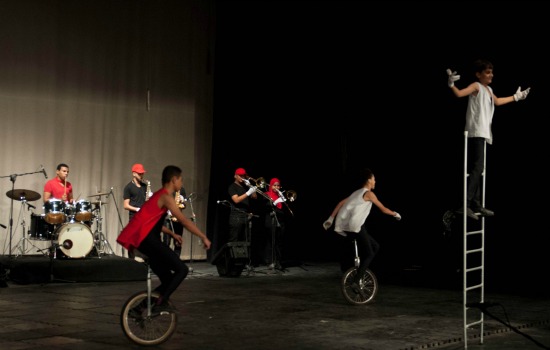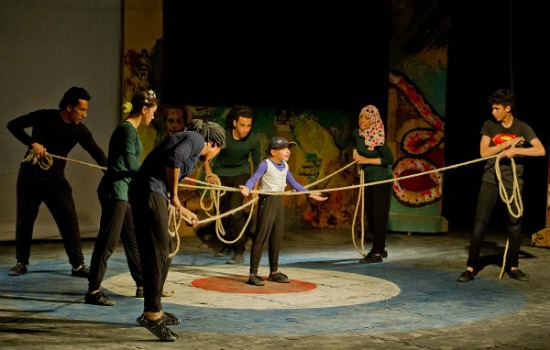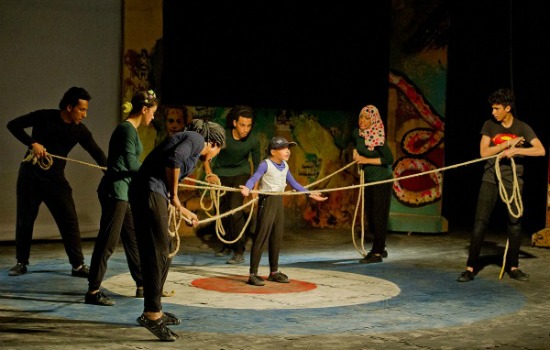
Targeting children aged eight to 18, DAAS opens its door for new students twice a year, after mid-term examinations in January, during which it accepts 100 or more students, and after final exams in May.
“Because some of the newly enrolled students eventually drop out for different reasons, the school accepts another batch after end-term examinations, during which we target 50 or more new students depending on the school’s capacity,” Khawla Abu-Saada, the director of DAAS since January 2013, tells Ahram Online.
Upon enrolment, each child chooses one of three specialisations offered at the school; circus arts, percussion or wind instruments.
Each specialisation has a rigorous two-year programme. Students must come in four hours a day, five days a week, and are given a bonus of LE100 a month. While students can attend all three specialisations, they cannot pursue them concurrently. Besides their art specialisations, students also receive English and computer lessons.
Forty-two children have graduated from the school since 2012, with some continuing in the arts field as a career. Some of the school’s graduates are now members of budding bands, or sometimes perform alongside known artists.
“At some point, we thought of organising performances for students to use skills they have acquired,” Abu-Saada explains. “The idea was to help them make money and also have some exposure. In 2013, we began to hold performances comprising circus arts and music in places like Beit El-Seheimi and Darb 1718.”
Eventually, DAAS resorted to bigger productions, producing three performances; Lost and Found, Darbaka — the end product of a two-week workshop by STOMP trainers from the UK — and most recently Balalika.
“In Lost and Found, we were eager not to force a play of our choice upon the students, and we hosted a story-telling workshop for them to integrate their own stories into the performance,” Abu-Saada says.
In 2015, the school was adamant to introduce another production that would reflect the “development DAAS has undergone since its onset. For example, in Lost and Found we only had two students playing instruments. Now, we have 19 specialised students, and as such we are more capable of holding bigger performances.”
The end product was Balalika, a performance comprising circus acts, musical performances and a clown show, all performed by second-year students as well as some graduates of the school.
As was the case in Lost and Found, DAAS students were given the space to contribute their own additions to the performance.
Since its debut performance last July in Downtown’s Al-Falaki Theatre, Balalika was staged on 19 October in Bibliotheca Alexandrina as part of this year’s round of the Backstreet Festival, and on 23 October in El-Sawy Culturewheel. It is scheduled to be staged again on 30 October in El-Genaina Theatre located in Al-Azhar Park.
Despite its overt success, however, the school faces an array of challenges that range from drop-outs to societal misconceptions about the arts.

Drop-outs
“The issue of drop-outs is the biggest challenge we face. Usually, students who enrol after mid-term examinations plan to spend their two-week break at the school and leave when the new term begins,” explains Abu-Saada.
But there are cases of students who develop a passion for the arts upon joining the school and aspire to undertake it as a vocation, but nonetheless eventually drop out from DAAS to make a living through other means.
“Some parents are convinced art does not constitute a job and prefer their children acquire other skills. Others are especially critical of girls who study arts at the school, and want them to stay at home instead. Moreover, others are critical of the concept of art itself and think that it is sinful,” asserts Abu-Saada.
“I remember this 14-year-old girl who was a student at the school and specialised in circus arts. She was skilful, and her mother allowed her to attend classes and take part in performances until the mother decided it was no longer appropriate for the girl to do so. She clearly wanted to marry her off.”
In such cases, Abu-Saada explains, the school’s management intervenes to offer solutions and negotiate with parents.
“We give scholarships that amount to LE250 per child (in addition to the LE100 bonus all children take as part of their enrolment) to working children. The idea is to allow them to attend arts classes while still maintaining a job on the side if they want to.”
But, as Abu-Saada explains, it is not always the parents who put pressure on the children to drop out and pursue work.
“We have cases of children, particularly teenagers, who feel the need to make more money and buy themselves stuff they need. While some students understand that training at the school, even if for little money, can pave the way for better future opportunities and hence potentially a bigger income, others are more focused on short-term needs, especially given the current trend of hyper-consumerism.”
There are also cases of students who feel restrained by the system and eventually dropout. “Some like to be able to train at whichever time they like. I try to explain that the system’s function is not to limit or restrain their freedom, but rather to facilitate management of the school,” Abu-Saada says.

From peer pressure to post-graduation support
While some DAAS students are inspired by their peers’ enthusiasm for the arts, and hence exert extra effort to learn more, negative peer pressure also exists.
“Some see their peers smoking and mimic them. There was more than one incident where we caught students smoking within the school premises. We reached an agreement that they cannot smoke inside the school, or in any school rehearsals or performances held elsewhere. They abided by this rule to a great extent,” explains Abu-Saada.
Throughout the past three years, the school’s management has not expelled a single student. However, there was one case of a student suspended for one month for bringing a street fight onto the school premises. “It was crucial to punish him, and also to show the neighbourhood that we’d never tolerate such acts,” asserts Abu-Saada.
“We’re always trying not to export any problems from the school and onto the street. The objective is not to overwhelm the street with a load it cannot carry, since it already has enough problems to deal with,” Abu-Saada explains.
While the school has not encountered any major clash with the neighbourhood’s residents so far, Abu-Saada explains how “some have a problem with the fact that girls and boys come in together.”
“There was one instance of a father who came in and asked that his daughter not talk to boys. I told him I could not prevent students from talking to their colleagues, but also ensured him that we have rules which we strictly enforce. He was convinced, especially since parents know they’re welcome to come in anytime and see their children.”
A total of nine trainers teach the school’s three specialisations in addition to solfege which complement some performances.
“For them the school transcends the idea of a work-place, and they see it, rather, as a place where they do give back to society and help these children,” says Abu-Saada.
But because these trainers do not usually have much knowledge in disciplining children, Abu-Saada as well as the school’s social worker must provide support, particularly when it comes to “dealing with the students’ behavioural problems and getting them to develop a bond with the instrument, etc.”
As for post-graduation ties with the school, Abu-Saada says the school encourages the graduates to “go out and experience life, encounter difficulties and overcome challenges away from their comfort zone, knowing that they can always get back to us for help.”
Other graduates may still need the school’s support in some way, “so we try to find opportunities for them. If they are willing and available, they can sometimes teach when trainers are absent. But this is done very informally, in that neither the school nor the students must abide to such an agreement.”
“If 10 out of the 40 graduates continue to work in the arts, that would be a great success. Also, those who do not pursue art as a career will have benefited from the experience somehow. They will have gained skills and experience, met with new people and taken part in performances. In other words, the experience will surely have a positive impact on their lives,” asserts Abu-Saada.
As for her dreams, Abu-Saada says she wishes to see “many similar schools across Egypt in impoverished and non-impoverished areas alike.”
“It is amazing how talented children can be. We need more schools to unearth such talents, especially given that normal schools lack the capacity to offer such specialisations and can only present general art lessons. In that sense, the presence of schools specialised in arts like the Darb Al-Ahmar Arts School can alleviate the burden from other schools.”
The Darb Al-Ahmar Arts School will perform Balalika on 30 October in El-Genaina Theatre, Al-Azhar Park, Cairo.
Ahram Online is an official media partner of El-Genaina Company for Arts and Culture Services


